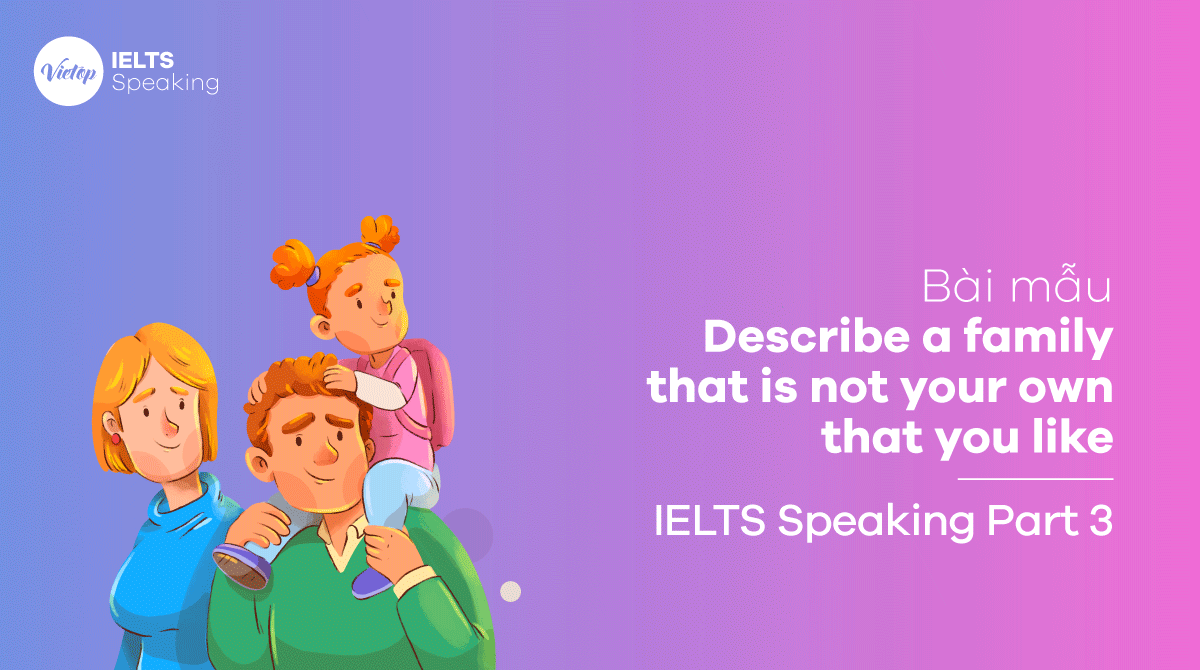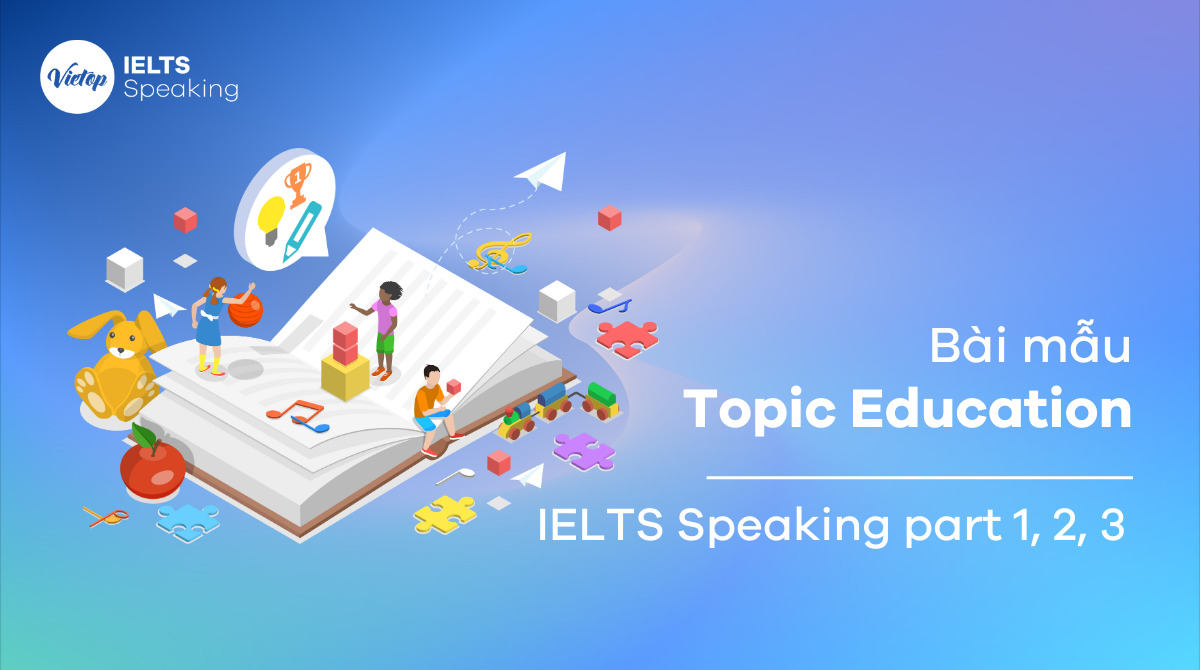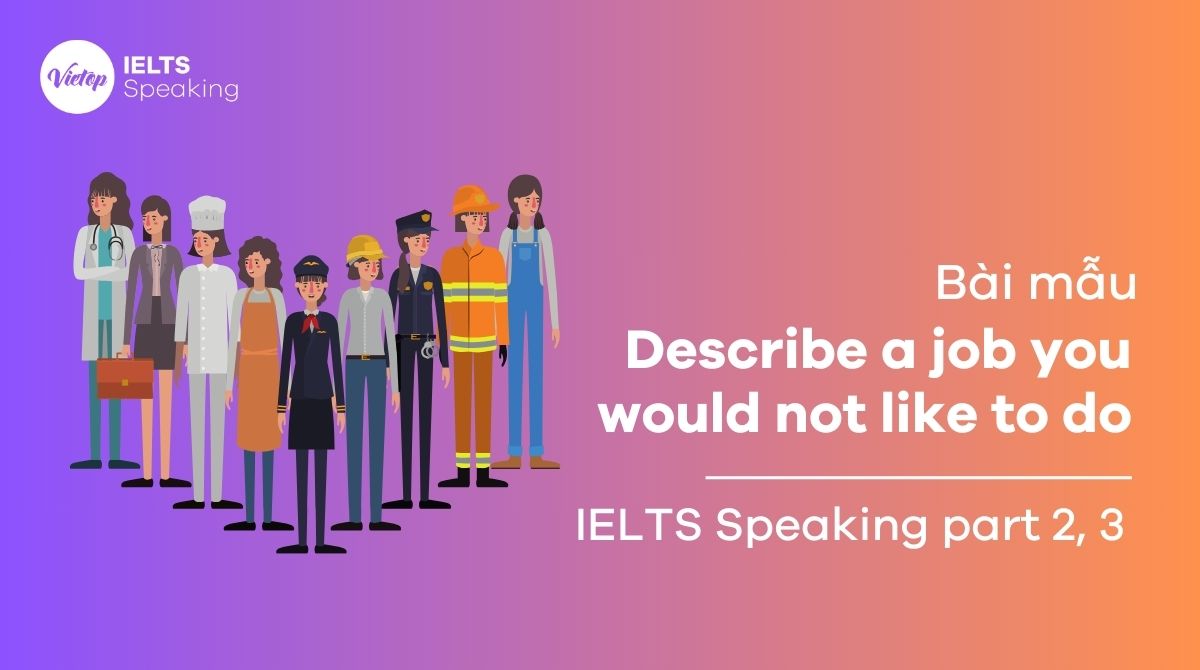Bạn đang học IELTS Speaking? Bạn đang gặp dạng đề Describe a family that is not your own that you like – IELTS Speaking part 2, 3 (xuất hiện trong bộ dự đoán Speaking quý I 2021), đúng lúc phim điện ảnh “Bố Già” khởi chiếu thì ngại ngùng gì không book vé xem phim ngay vừa giải trí vừa có nguồn cho bài nói của mình.
Cùng tham khảo bài mẫu cho chủ đề này sau khi mình đã xem và cảm nhận về gia đình ông Sang trong bộ phim. Có cả bảng audio cuối bài viết, bạn có thể nghe và áp dụng trong bài thi của mình nhé!
1. Describe a family that is not your own that you like – IELTS Speaking part 2

| Describe a family that is not your own that you like You should say: Whose family this is Where they live Who are the family members Why you like this family |
Sample
I would like to talk about a fictional family from a newly released movie called Bố Già. The movie tells the tale about a 3-person family residing in an impoverished community in Ho Chi Minh city. The head of the house, Mr. Sang, is an aged man. He has a thick and unkempt mustache while his outfit is always dishevelled.
He’s an honest and hardworking man who does physical work to make ends meet. Towards his sibling’s families, he’s affectionate to a fault. At times, they have exploited him for his kindness. On the other hand, his son Quắn is his polar opposite. Quắn is well-groomed and stylistic as he is an up-and-coming social media influencer.
Aside from his plan to climb the social ladder with an unconventional career path, he also values individuality and personal freedom even at the cost of falling out with his distant relatives. Mr. Sang and Quắn sometimes clash over different points of view. In these tense situations, Bù Tọt, the mischievous 6-year-old daughter, is often there to defuse.
This family isn’t perfect and their story isn’t glamorous. Yet that is precisely why I’m so fond of them. They’re depicted realistically. Personally, I empathize a lot with the son, since we’re of the same age and I share his individualistic lifestyle. I also like the fact that even when he has heated disagreements with his dad, he still loves his father to the core. As an avid moviegoer, this is the first time I’ve seen a faithful portrayal of a Vietnamese family on the big screen. I am sure they will continue to touch the hearts of millions of their audience.
Tham khảo:
Cách học bảng chữ cái tiếng Anh
Audio
Vocab highlights
- Impoverished (adj): nghèo túng
- Unkempt (adj): bù xù (khi tả râu tóc)
- Dishevelled (adj): xốc xếch (khi tả cách ăn mặc)
- Physical work (expression): lao động chân tay
- To make ends meet (expression): kiếm thu nhập vừa đủ sống
- Be adj + to a fault (expression): một cách vô cùng, thái quá (thường đi sau tính từ). Affectionate to a fault: thể hiện tình thương một cách thái quá
- Polar opposite (expression): người/ý kiến đối nghịch (nghĩa bóng)
- Well-groomed (adj): ăn mặc đẹp, chải chuốt
- Unconventional (adj): trái với truyền thống
- Individuality (n): tính cá nhân.
- Mischievous (adj): tinh nghịch (khi miêu tả trẻ em)
- Defuse (v): làm giảm nhẹ gỡ rối
- Glamorous (adj): hào nhoáng
- Be fond of (expression): có cảm tình
- To the/someone’s core (expression): bằng tất cả tấm lòng
- Faithful (adj): trung thực (tả cách khắc họa nhân vật). Faithful portrayal: cách khắc họa trung thực
- The big screen (expression): màn ảnh rộng
Xem thêm:
- Describe an occasion when you received incorrect information
- Describe someone you know who does something well
- Describe a time when you were really close to a wild animal
2. Describe a family that is not your own that you like – IELTS Speaking part 3

Mời bạn cùng nghe Podcast bài mẫu Part 3 của Vietop English nhé:
2.1. Who do you think should be responsible for the care of the elderly, the family or the government?
In my opinion, taking care of the senior citizen should be the responsibility of both the family and the government. The family should be the first line of support, whereas the government should provide the infrastructure to assist the old people in the community. Close relatives understand most clearly the wants and needs of their elderly family members and they can instantly fulfil these needs.
They live together so the younger relatives can also monitor the physical and mental health of their older relatives. On the other hand, the governmental authority has the ability to collect taxes to build roads, hospitals and execute social programs. These facilities enable swift and quick responses in cases of emergency. For the seniors who live alone, the social programs such as volunteers coming to their house to talk and help them with housework help them avoid solitude.
- Infrastructure (n): cơ sở hạ tầng
- To monitor (v): theo dõi
- Governmental authority (expression): chính quyền
- Solitude (n): tình trạng lẻ loi
Để làm được các dạng bài IELTS Speaking part 2, 3 với chủ đề Describe a family not your own that you like. Bạn cần nắm vững gì kiến thức nào? Để làm được các dạng bài này bạn cần có nền tảng vững chắc về từ vựng và ngữ pháp tiếng Anh, nó là bước đệm quan trọng để bạn tiếp tục nâng cao khả năng ngôn ngữ bạn, cần có kỹ năng giao tiếp kha khá với người khác, kỹ năng nói thành thạo,…Tham gia ngay khóa học IELTS 6.0 tại Vietop English.
Sau khi kết thúc khoá học bạn sẽ đạt được những gì? Trước hết bạn sẽ sở hữu khả năng sử dụng ít nhất 7 dấu hiệu ngữ pháp và 7 thuật ngữ thành ngữ, cùng với từ và cụm từ ít phổ biến một cách tự nhiên xuyên suốt bài nói, sẽ giúp bạn tạo nên một bài phát biểu đầy ấn tượng và phong phú; hiểu và tiếp thu các bài hội thoại cũng như độc thoại, từ những chủ đề quen thuộc đến các vấn đề học thuật sâu sắc. Đặc biệt hơn, bạn sẽ có được bằng IELTS 6.0 thoả sức đi du học. Đăng ký để ngay để ôn và luyện thi IELTS ngay. Đừng bỏ lỡ khoá học, hãy đăng ký khoá học thú vị này.
2.2. Why is the number of joint families decreasing in modern time?
I think the reasons are purely economical. In the past, at least in Vietnam, most places were not urbanized and most people were involved in farming. Having extended family members living together could help with labor division. For example, the adults in a family did all the labor-intensive work, while the younger ones would safeguard their crops from other animals. Besides, living together also helped them save cost.
In the modern days, the economy has shifted from agriculturally centric to service oriented. Coupled with the fact that people can travel anywhere to settle down and get a job, large families tend to break apart and become smaller units.
- Labor division (n): sự phân chia lao động
- Labor-intensive work (expression): công việc nặng nhọc
- Coupled with (expression): cộng với
2.3. What characteristics do elder siblings often have?
There are both positives and negatives traits that an older sibling usually possesses. One the positive side, older sisters and brothers can be very protective of their younger siblings. This helps the younger ones avoid being bullied, especially if they go to the same school. Other times, older siblings may also share their life experience to help their younger brothers and sisters navigate better in life.
On the other hand, there might be subtle jealousy coming from the older siblings. Studies have shown that parents are often more stringent towards their first child, while being more relaxed when it comes to disciplining their younger children. The oldest child may perceive this as unfair treatments, and later harbor contempt towards their younger siblings.
- Trait (n): nét, đặc điểm
- Navigate (v): lèo lái, xoay trở (trong cuộc sống, nghĩa bóng)
- Subtle (adj): không dễ phát hiện
- Harbour (v): nuôi dưỡng (ý niệm xấu). Harbour contempt: nuôi dưỡng sự coi thường
Xem thêm bài mẫu Speaking:
- Cách trả lời câu hỏi: What do you do in your free time?
- Bài mẫu Daily routine – IELTS Speaking part 1
- Bài mẫu topic Birthdays IELTS Speaking part 1
2.4. What do you think about single parent families?
I guess this family model is becoming more mainstream where I live. This could be the result of other social changes. In the past, the Vietnamese families were under extreme societal pressure to preserve the perceived marriage fidelity. A broken family would be subjected to cruel rumours and maltreatments even from their relatives and neighbors. Today, the same norm is still present.
The severity of it, though, is becoming lesser and lesser. The newer generation has latched onto this trend and has been more straightforward in escaping unhappy marriages. As a result, divorces happen more and thereby increase the number of single parent households.
- Fidelity (n): lòng chung thủy
- Maltreatment (n): sự ngược đãi
- Norm (n): quy chuẩn
- Severity (n): độ nghiêm trọng
- To latch onto something (expression): bám vào cái gì đó
- Straightforward (adj): cởi mở (cách nhìn)
Các bạn có thể ra rạp để trực tiếp xem và cảm nhận “Bố Già” theo cách riêng của mình nhé!
Hy vọng rằng, với những chia sẻ của Vietop English về describe a family that is not your own that you like – Bài mẫu IELTS Speaking part 2, IELTS Speaking part 3 sẽ giúp bạn có được điểm số cao trong bài thi IELTS của mình nhé.
Chúc bạn thành công!









